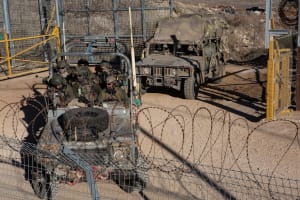EXCLUSIVE: Former Israeli PM Naftali Bennett to Evangelicals: 'Come to Israel, speak up, don't let anyone talk bad about the Jewish state'
In a message to Biden, Bennett tells THE ROSENBERG REPORT on TBN: ‘We tried the two-state solution, and it blew up in our faces twice, with the 2nd Intifada and with Oct 7’
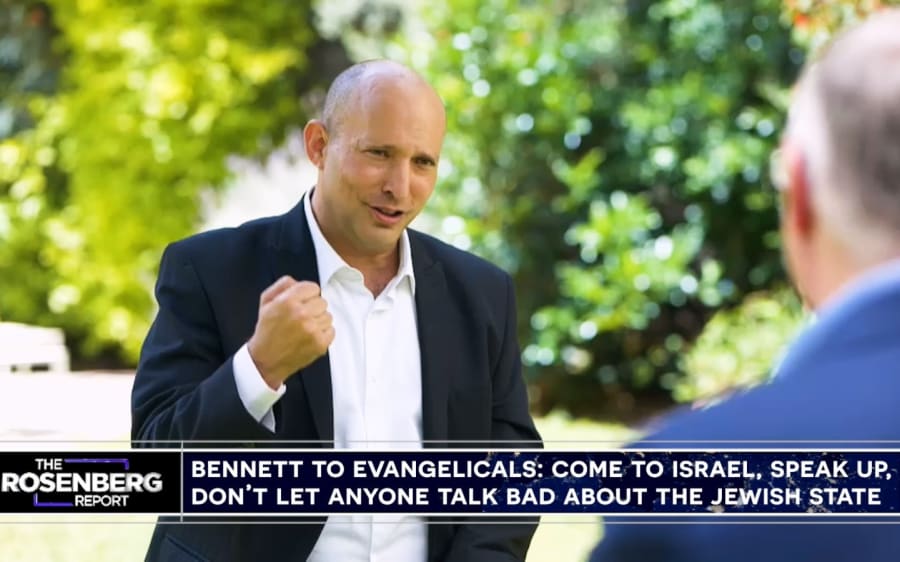
Former Israeli Prime Minister Naftali Bennett was no longer in office when Hamas terrorists launched their deadly Oct. 7 invasion of the Jewish state. Nevertheless, he has been busy speaking to international media and communities worldwide about Israel’s justified war objectives. He has given dozens of interviews while keeping one principle in mind.
“I have a habit where I don't criticize my government on foreign press,” Bennett told All ISRAEL NEWS Editor-in-Chief Joel Rosenberg in an exclusive interview for THE ROSENBERG REPORT on TBN.
Even though he has been asked on several occasions to share his thoughts on Prime Minister Benjamin Netanyahu’s War Cabinet handling of the war and events leading up to Oct. 7, Bennett refused to criticize his political rivals in the middle of a war. With one exception.
When asked by show host Rosenberg about Israel’s response to Iran’s unprecedented direct attack on its soil last month, with more than 350 missiles and drones, Bennett hinted that he was not satisfied with what he saw.
“A response should be so big, so hard, and so painful that the other side will have to think a thousand times about it,” he told Rosenberg.
Bennett believes Iran should be handled according to what he calls the “Octopus Doctrine.” He views the regime in Tehran as an octopus that sends its tentacles all across the Middle East to sow chaos and terrorize. These are the Iranian-backed proxies such as Hamas and Palestinian Islamic Jihad (PIJ) based in the Gaza Strip, Hezbollah in Lebanon, the Houthis in Yemen and the militias in Syria and Iraq.
“There are two options,” he explained. “One is to begin fighting all around, but another is to focus on the head of the octopus and strangle it until it collapses. That's what America did to the Soviets throughout the 1980s.”
“There was never a need for America to attack the Soviets. America never bombed the Soviet Union, yet the Soviet Union collapsed from within. Same thing will happen in Iran,” Bennett said.
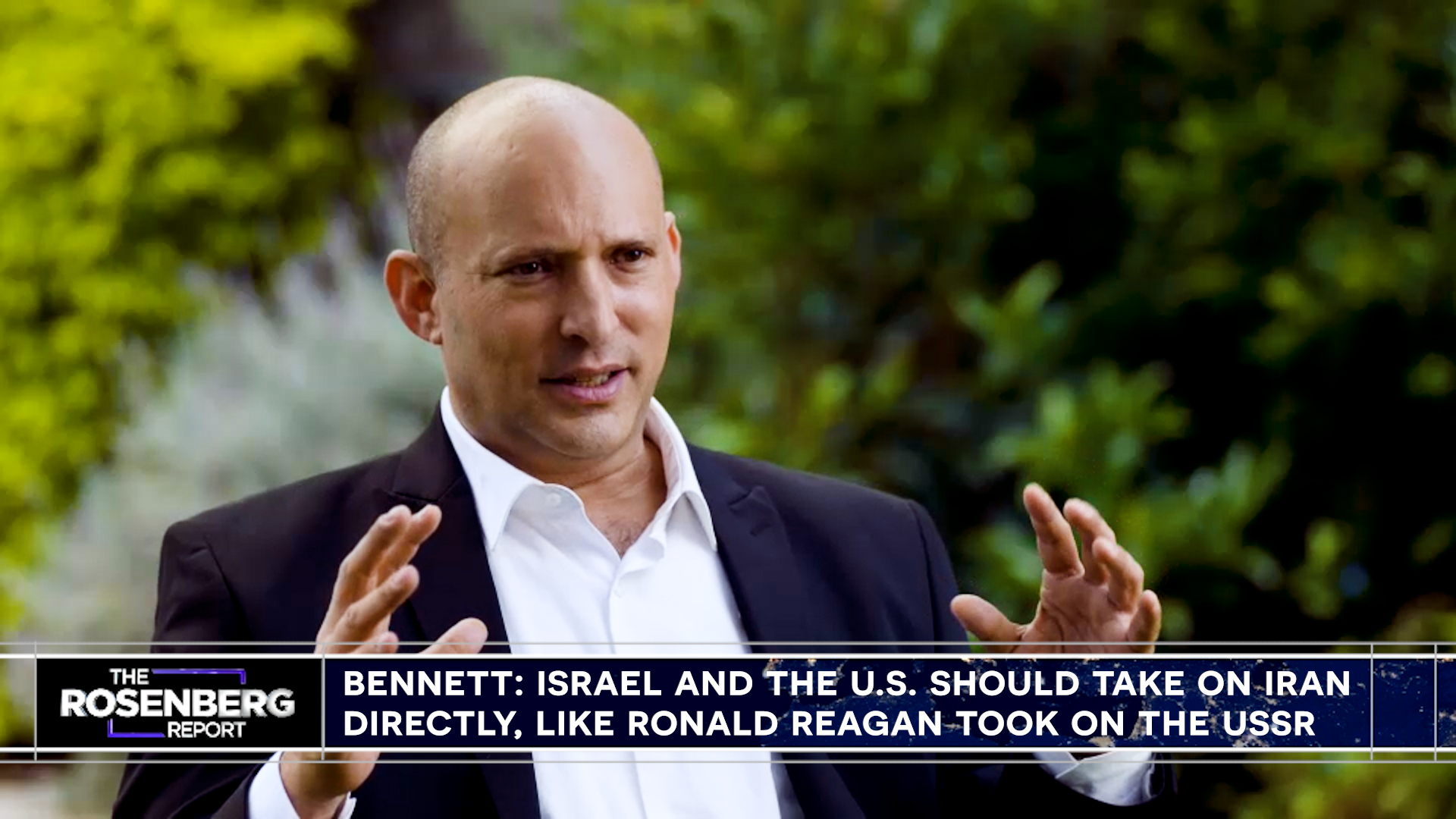
The former prime minister believes that Israel and the United States should take on Iran directly, as he wrote in The Wall Street Journal last year. He thinks that by using “soft tools” against Iran, an all-out war can be prevented.
“I'm talking about economic, intelligent warfare… cyber, covert and overt… I'm talking about empowering the opposition in Iran to fight the regime,” he elaborated. “If we are very aggressive on the world stage in isolating Iran and weakening that regime, I think we can avert the war.”
Yet, Bennett is not ruling out the use of military force against the Iranian regime. He revealed that during his tenure as prime minister, in several cases when Israel was attacked indirectly by Iran, it responded directly to Iran.
“I think that should be the way we operate. When Iranian proxies like Hezbollah, Hamas, Islamic Jihad, shoot rockets at Beersheba or at Tel Aviv, we shouldn't only be fighting the arms. “Someone in Tehran should be paying a price,” he said.
Bennett served as Israel's 13th prime minister from June 2021 to June 2022, as part of a rotation in a short-lived union with the current opposition leader, Yair Lapid. He is the only modern-day Israeli premier to be an openly religious Orthodox Jew.
“I absolutely see a connection between our ancient past, our biblical past and our present and future as an eternal chain to the Jewish people and the land of the Jewish people. I see a continuity between Abraham, Isaac, Jacob and Moses, Joshua, King David,” he told Rosenberg.
“And then, during the First and Second Temple, later in the diaspora for 2,000 years, we were praying for our home three times a day. All the Jews prayed to come back to Jerusalem. And then indeed, there was a return of Jews from all across the world. That's precisely what's in the Bible.”
Bennett added: “I think that modern-day Israel is the beauty of both modernity that gets intertwined with our biblical roots and our destiny.”
Against this perception, Bennett weights the meaningful role he has played so far in the journey of the Jewish people in their biblical homeland. When he stepped in to replace Prime Minister Benjamin Netanyahu, the two met for 20 minutes in the Prime Minister's Office.
“Then he left, and I stayed there alone. I walked and sat down at the Prime Minister's chair,” he recalled. “And I realized the huge, profound responsibility the prime minister of the only Jewish state has. It's a link in our eternal chain. But we have a huge responsibility, and we cannot take anything for granted.”
This feeling resonates with many Israelis since Oct. 7 – when the Hamas terror group perpetrated the worst massacre of the Jewish people since the Holocaust, undermining the nation's very basic sense of security.
“How do you see what happened on that southern border on that horrible day?” Rosenberg asked Bennett.
“Well, Joel, that's a very tough question. I would say on October 7th, there are two halves of the story. The first is that Israel had a colossal, epic failure that should never have happened. Failure in intelligence and operations… a total meltdown of the institution,” Bennett replied.
“But the second half of the story on October 7th was the rise of the Israeli people, the nation. I coined the term ‘a nation of lions’… Thousands of Israeli young men and women from all around Israel that were not necessarily soldiers, that were reservists, that were policemen, got on cars and drove into harm's way down to the south.”
Even though institutional Israel has failed, Bennett added, he stressed that the people of Israel “stood up to the plate.”
As for the U.S. handling of the situation, the former Israeli premier noted that both Israeli President Joe Biden and the American people were “amazing in their deep, heartfelt support.” He acknowledged that as the war progressed, the pressure from certain groups like students on college campuses was “waning of some support of Israel in some circles.”
“It's no secret that there's a meaningful disagreement regarding the goals of the war, regarding Rafah,” he added.
While Israel is determined to carry out an extensive military operation in Rafah to finish off the last four operational Hamas battalions in Gaza’s southernmost city, the Biden administration has expressed outrage over the idea and threatened to withhold congressional-approved weapons shipments into Israel if defied.
Despite the ultimatum from the White House, Bennett is convinced Israel should plow ahead.
"I think we have no choice. I think we have to go in and dismantle Hamas. Hamas cannot be left standing,” he told Rosenberg.
Another point of contention between Jerusalem and Washington is the plan for Gaza "the day after" Hamas is defeated. The Biden administration keeps insisting that a two-state solution based on the 1967 borders is the only way to achieve peace between Israelis and Palestinians, including normalization of ties with Saudi Arabia.
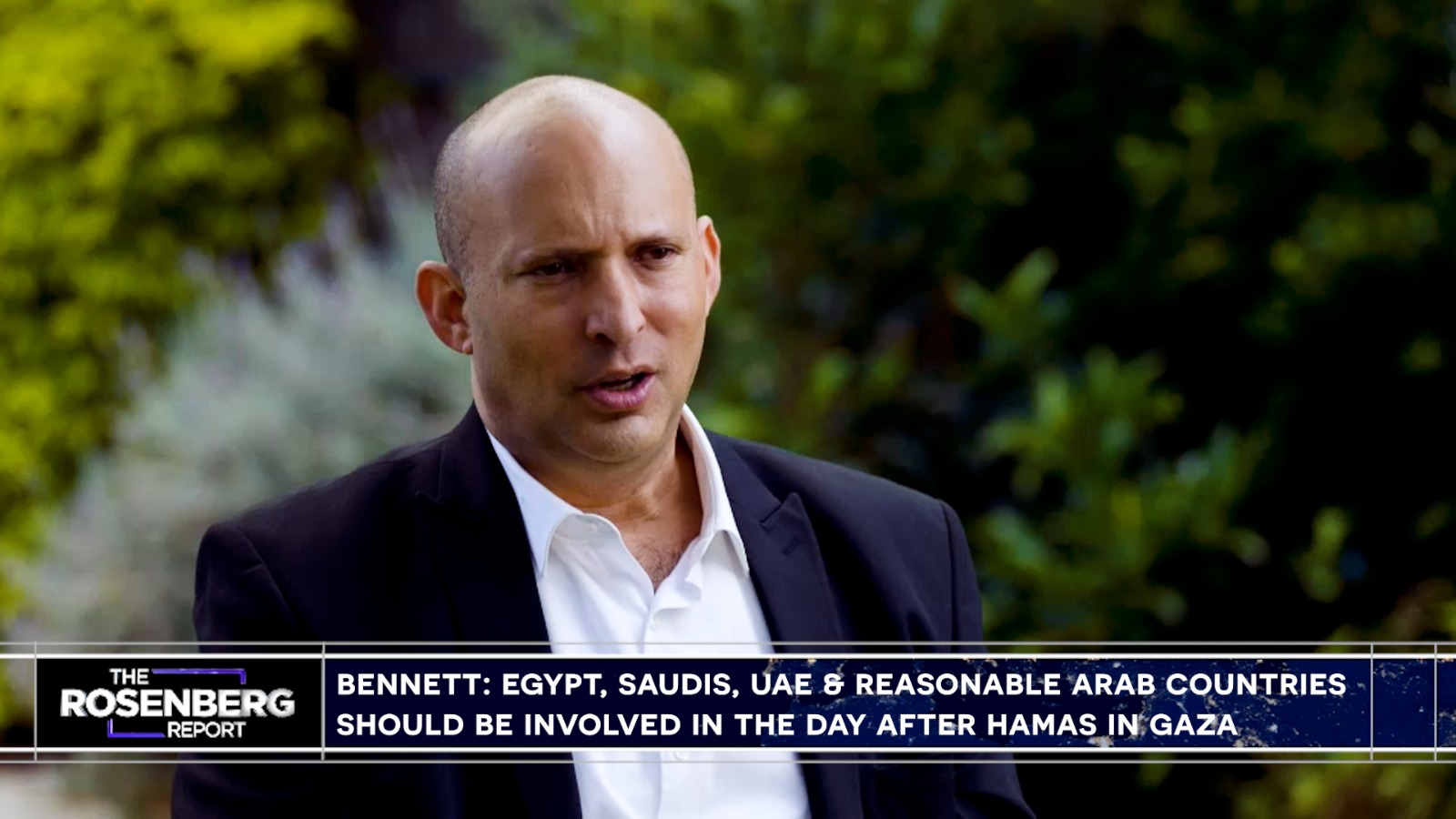
The U.S. says it wants to see a “revitalized” Palestinian Authority in control of Gaza. Bennett, reflecting the position of man in Israel, vehemently opposes that notion.
“The Palestinian Authority today is part of the problem, not part of the solution,” he said. “They are teaching incitement in their schools, in the mosques, in the media. They are calling again and again...to say that Jews ought to be killed. They actually have a menu of how much you get paid for – based on how many Jews you kill. It's called pay-to-slay.”
He explained that Israel, in fact, has tried the so-called "two-state" solution twice – both in Gaza and the West Bank – and it has utterly failed.
“It blew up in our faces,” he stated.
First, in the Second Intifada when about 4,400 Israelis were killed during violent attacks and terrorism emerging from the West Bank. The second time was Oct. 7.
“Israelis have very little appetite for this experiment the third time,” Bennett explained.
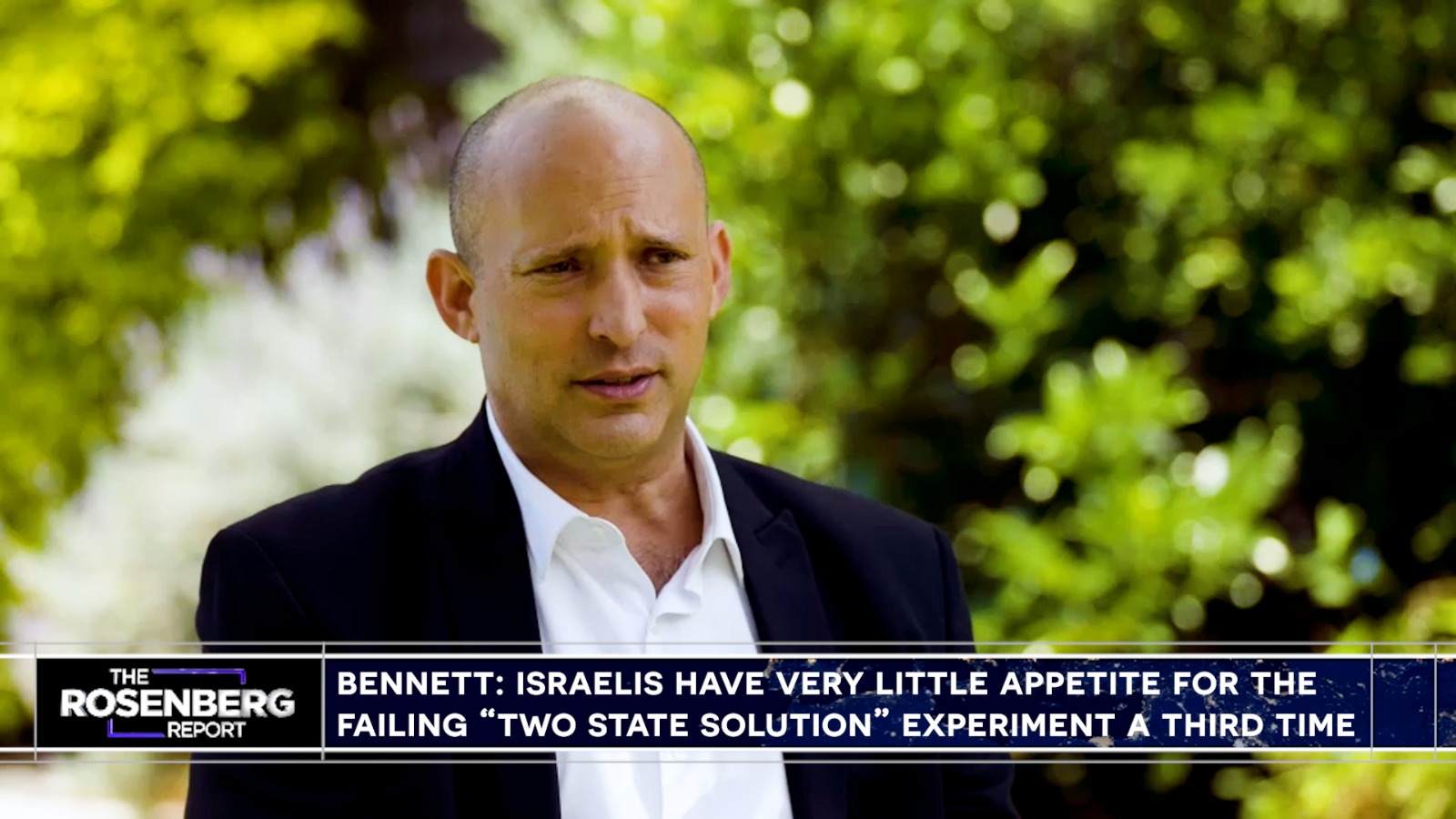
When asked about his vision for Gaza after the war, Bennett said Israel will have to keep a “robust buffer zone in Gaza for the foreseeable future” and estate a Palestinian technocratic government in the interim.
He only envisions a self-governing Palestinian autonomy in Gaza years sometime down the road, after Palestinians recognize the State of Israel and go through a deep process of de-radicalization.
The big question is: Will Bennett (52) actually get to lead the Jewish nation toward such a horizon?
“I pledged that I would do everything in my power to serve my country because that's what I care about My family and my country,” he told Rosenberg. “And if I decide to join politics, let's sit down and I'll announce here.
In the meantime, he has a message to Evangelical supporters of Israel.
“As a man of faith, I deeply appreciate and respect the great love Israel is getting from hundreds of millions of Evangelicals,” he said. “It means a lot. The love that you show to the Jewish state matters. Come to Israel, speak up. Don't let anyone talk bad about the Jewish state.”

The All Israel News Staff is a team of journalists in Israel.
You might also like to read this:








